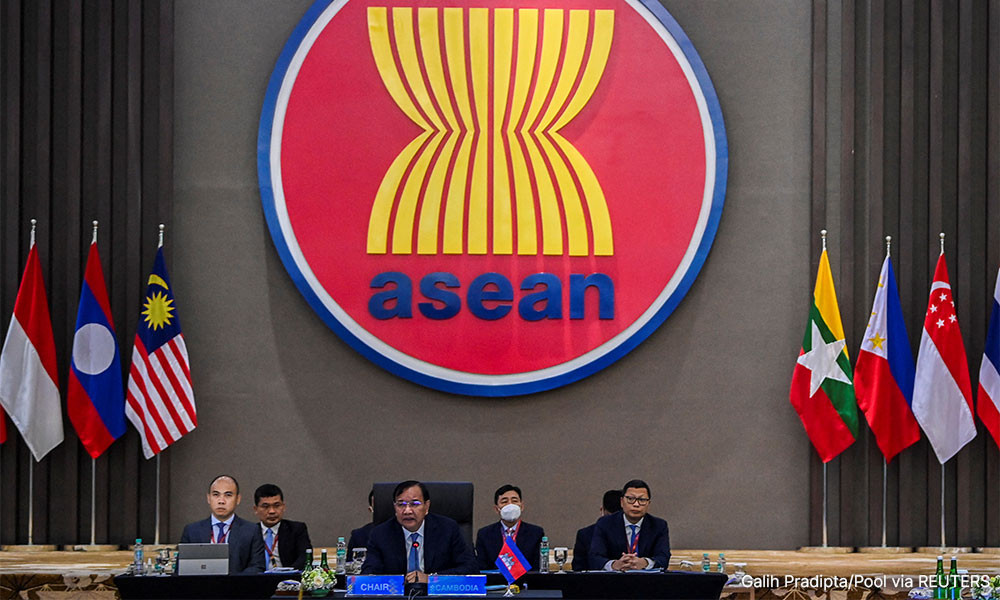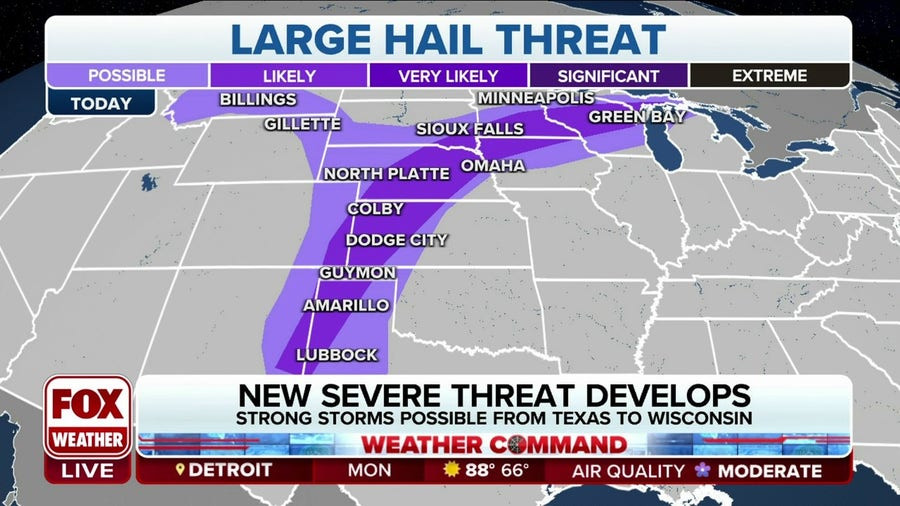Over three years into the conflict that has ravaged Myanmar, there are fears that the international community is placing too much hope in the Association of Southeast Asian Nations (ASEAN) securing peace.
ASEAN, a political and economic collective of ten countries based in Southeast Asia, ‘doesn’t have the tools and the history of resolving a crisis on the scale that Myanmar is facing,’ says Bryony Lau, Deputy Asia Director at Human Rights Watch (HRW). Other global powers, such as members of the UN Security Council, could have more impact, she explains. Yet, given its geographic proximity to Myanmar, the world has looked to ASEAN to take the lead on handling the civil war.
The conflict began when Myanmar’s military deposed the country’s democratically elected government in 2021 and citizens later rose up against them. Since then, over 5,500 civilians and pro-democracy activists have been killed and 27,000 imprisoned, according to the Assistance Association for Political Prisoners (Burma). Meanwhile, statistics from the Internal Displacement Monitoring Centre show that as of 2023, the conflict had displaced some 1.4 million people.
Addressing the crisis in their latest communique released in July, ASEAN continued its calls for restraint and said it remained committed to pushing for progress via the Five-Point Consensus (the ‘5PC’). This is a plan conceived by ASEAN in partnership with Myanmar’s de facto government, known as the State Administration Council (SAC), in 2021. It committed all parties to ending violence, engaging in dialogue to find a peaceful solution and facilitating humanitarian assistance.
So far, according to human rights groups such as Amnesty International, the military junta has largely ignored the plan. Instead, the ‘human rights situation in Myanmar has morphed into a never-ending nightmare’ with ‘three years of military operations designed to repress, terrify, dehumanize and destroy’, in the words of Volker Türk, the UN High Commissioner for Human Rights, speaking in March. While jurisdictions such as the EU, UK and US have imposed sanctions on the SAC, this has had limited impact.
ASEAN's Limitations
The main issue limiting ASEAN’s ability to end the conflict or broker peace, says Mark Stephens CBE, Co-Chair of the IBA’s Human Rights Institute, is that ASEAN – which was established in 1967 by foreign ministers to facilitate increased cooperation in economic, social, cultural, technical and educational areas – ‘is more of a trade bloc than a political bloc.’
ASEAN’s current membership consists of Brunei, Cambodia, Indonesia, Laos, Malaysia, Myanmar, the Philippines, Singapore, Thailand and Vietnam. With so many ‘autocratic’ states within ASEAN, ‘it’s really difficult to promote the rule of law,’ says Stephens.
Erin Murphy, a senior fellow for the Asia Program at the Center for Strategic and International Studies, based in Washington, DC, adds that ‘there are some countries in that make-up that aren’t necessarily the most democratic [and] that don’t really care about what is happening [in Myanmar]. There’s frustration in Indonesia and Malaysia. Vietnam, I think, is somewhat neutral.’ Cambodia’s approach, says Murphy, has perhaps been surprising – for example, the country has pushed Myanmar’s military to implement the 5PC. Ultimately, Murphy says that ASEAN’s actions vary depending on who the bloc’s current chair is.
Malaysia's Role
Each year, an ASEAN member state is appointed as a chair and it’s their responsibility to be a spokesperson for the cohort, to chair meetings and promote new ideas to facilitate regional cooperation. The current ASEAN chair is Laos, considered ‘an authoritarian centralised one-party state’ by the US. In 2025 however it will be Malaysia, which is often seen as somewhat more democratic. Its chairmanship could bring a change of approach when it comes to Myanmar, says Chris Gunness, Director of the Myanmar Accountability Project, which works with civil society within the country to build criminal cases against individual members of Myanmar’s junta.
ASEAN hadn’t responded to Global Insight’s request for comment at the time of publication, though it has said it’ll conduct a comprehensive review of the implementation of the 5PC ahead of the 44th ASEAN Summit, to be held in Laos in October. But Murphy believes ASEAN has done more than expected of it by not inviting senior Myanmar military officials to the bloc’s meetings and by putting forward the 5PC, while it created a new role in 2021 in response to the coup – the Special Envoy of the ASEAN Chair on Myanmar. ‘There’s only so much I think you can do and I think [ASEAN has] been surprised about the intransigence of the junta and how [ASEAN is] completely unable to get them to do anything that they’ve asked,’ she says. ‘It's less of a failure in ASEAN and more [a case] of indicating just how difficult this issue is.’
Looking Ahead
Looking ahead, Murphy is concerned that as time goes on, ASEAN will lose patience and that a sham election recognising the SAC in Myanmar would be accepted by the bloc as a means to move forward. Many commentators believe that the wider international community must be more active in addressing the conflict.
‘We’re going to have to think creatively here,’ says Murphy. She suggests India, as a larger state in the region, might play a bigger role in finding a solution alongside the UN. The UN Security Council adopted a resolution on Myanmar in 2022 calling for an end to violence and the release of all political prisoners. Meanwhile, a report published in June by Tom Andrews, the UN Special Rapporteur on the situation of human rights in Myanmar, exposed how a number of foreign banks are facilitating the junta’s access to weapons and related materials.
But the UN could do more, says Murphy. For example, the role of Special Envoy of the UN Secretary-General on Myanmar was left vacant for almost a year until Julie Bishop took up the role in April.
On the ground in Myanmar, the armed resistance to the junta made significant gains through ‘Operation 1027’ in October 2023 and continues to wrestle back more control of the country. Their gains offer hope that eventually the military will be ousted. ‘On the battlefield, things are changing. Diplomatically things are changing. Financially, looking at cash flows and arms flows to the junta, things are changing,’ says Gunness. ‘It’s making their room for manoeuvre tighter, and that can only really ever be a good thing.’
The Path to Peace
In the meantime, Lau of HRW hopes that the international community continues to recognise ASEAN’s distinct role in handling the situation whilst acknowledging that the bloc can’t solve it alone.
The civilian government was abruptly ousted in a military coup in February 2021, forcing many democratically elected leaders into prison, including the National League for Democracy party head Aung San Suu Kyi currently under house arrest. About 4,000 people were killed and nearly a million were displaced since the coup. Despite Asean’s cardinal non-interference policy, several members including Malaysia, unequivocally condemned the coup but it was an exercise in futility.
“There is a tinge of optimism in 2025 as Malaysia takes over the Asean leadership as Malaysia is a major member of Asean. The level of expectation is gradually growing within Asean, but it will be a challenging task for Malaysia.
“Malaysian leaders must first consult United Nations Special Envoy (of the Secretary-General on Myanmar) Julie Bishop, and the Malaysian Foreign Minister should travel to all the five capitals in China, Bangladesh, India, Laos, and Thailand; all of them share borders with Myanmar and are suffering,” India’s former Ambassador to Myanmar Rajiv Bhatia told Bernama from New Delhi.
During his recent visit to Russia, Prime Minister Datuk Seri Anwar Ibrahim sent an early message urging the global community to drop the one-sided archaic conflict mediation process — pushing an external agenda that does not fit the domestic political equation — and instead adopt a pragmatic approach to soften tensions.
“We do not want to dictate to Myanmar. The problem with the failure sometimes in dealing with Myanmar’s military is we try to dictate that we want a democratic transition.
“I think what is important for Myanmar is peace. Get all the parties to speak to each other and maintain peace and then they can decide for themselves what form of government they want to have. Our problem in the past is we dictate to them what government they should have,” he said.
Malaysia hosts about 200,000 Myanmar refugees.
International experts concur with Anwar’s perspective. Asean cannot work in isolation and building consensus is paramount to initiating any peace talks with the junta.
Rajiv proposed Malaysia should start a series of dialogues, especially with the three dominant countries — China, India, and Thailand — that have significant influence with the military leaders and send an assertive message that Asean is ready to foster peace, and all violence must cease immediately.
“Malaysia can organise sustainable proximity talks with the military, resistance groups and Malaysia plus a few Asean members. The problem in Myanmar was not caused by Asean but by internal forces, it is an internal problem. Asean is an outsider.
“The military is hoping for a solution, and they want to withdraw, they want an honourable exit. There is fatigue among the military and the people at large, now they just want peace,” said Rajiv, who has been monitoring Myanmar politics for nearly three decades.
Bangkok-based veteran regional expert Kavi Chongkittavorn said that any peace-building initiatives with Naypyidaw need the support of neighbouring governments who share the same vision.
“Collective Asean support is important, and they cannot divert from the 5Cs (five-point consensus). Prime Minister Anwar has spoken strongly on international affairs and Malaysia has good relations with China, Bangladesh, and Thailand.
“Malaysia must engage Thailand because we share borders with Myanmar and facilitate humanitarian assistance, but we are also bearing the brunt of the conflict,” he said.
The five-point consensus is: a cessation of violence; constructive dialogue among all parties; mediation facilitated by an envoy of Asean’s chair, providing humanitarian assistance, and a visit by the special envoy and delegation to Myanmar.
Changing regional dynamics — Anwar’s rising global popularity, the return of the Thaksin dynasty and the incoming of a new Indonesian President — will have a profound influence on resolving the crisis and promoting regional solidarity.
In remote Myanmar, brutal fighting between the military and ethnic minority groups goes unabated — in Kachin, Rakhine, and Shan states, as well as the Sagaing region — unbearable human miseries continue to mount daily. The verdict of history will be harsh if Asean fails, again in Myanmar.

















